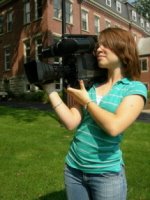 Senior year has been all about perfecting the skills I want to take with me on my future career path. Plus the senior capstone project for broadcast majors at Westminster College surrounds a group of abilities that we're working with at a higher level to create a unique final outcome. It would only make sense that we're doing something we like, something we're good at, and something that we've worked at over our years.
Senior year has been all about perfecting the skills I want to take with me on my future career path. Plus the senior capstone project for broadcast majors at Westminster College surrounds a group of abilities that we're working with at a higher level to create a unique final outcome. It would only make sense that we're doing something we like, something we're good at, and something that we've worked at over our years.That's the main reason I chose to combine reporting and producing. TV reporters and video storytellers need to plan, shoot, interview, write, speak, and edit effectively. Although many classes have worked on these skills, one in particular stands out: Broadcast Journalism II: TV Reporting.
This class used the notion: practical experience is best. We spent most of our time actually creating TV stories for The County Line. Besides making a package every other week, we also had to attend a borough meeting, get feedback from a person in the business, create a resume tape, and offer constructive criticism to the other students. These assignments were beneficial to me and made me grow as a reporter and storyteller. In a way, I think this class gave me ideas of what to do for my capstone project.
OH WAIT, but I forgot one thing: the hardest, most-challenging part of the class was our most important assignment: the deadline project.
Our professor, Mr. Brad Weaver, thought it was necessary to have us experience what it felt like for TV reporters in the business by creating a package all in one day. This included shooting the video, doing interviews, capturing the video, writing the story, editing the package, and dumping the story back to tape. Mr. Weaver allowed us the opportunity to set up our story ahead of time, by doing some pre-production elements, but that was it. And really, we shouldn't have been able to do that because most reporters learn of their stories the day of and they just go do it in a matter of a few hours.

I must admit I was pretty nervous about the whole thing. Before that project, I tended to work on a package over a span of a couple days, in separate steps. Plus, sometimes (as bad as this was, I now realize it doesn't work very well) I would write the story as I edited. One of the most important things I learned was to pay attention to what video you have so you can write a story that works, then record the audio, then put the video to the story. It takes less time, and you end up having a better product at the end, because you know where you're starting and ending before you sit down to edit. That's not to say you can't change a couple things along the way, but you don't compromise what you really want to get across in your story.
Overall, the assignment was a little stressful, but a good experience. I got up early to shoot my story: I decided to do explain the role of the IRS Criminal Division by following them around for a simulation day at Westminster. Despite being up early, I wanted video from each major event, but they were spread throughout the day. As much as I wanted to edit earlier in the day, I couldn't, and I felt like I was running out of time. One thing I did learn about interviews was to ask enough questions, but don't ask about EVERYTHING. Some of my interviews were really long, and it was hard to find what I needed when I sat down to edit and pick my sound.
The editing process also was tedious, especially when I went to render the project and the computer started to freeze. I had to restart the computer and redo a number of edits, but somehow I still finished on time. The deadline project was one experience I will never forget...it also allowed me to see what you need to do when you're under the pressure of the deadline and the easier way to do things when creating a TV package. You can watch my final product below!






No comments:
Post a Comment